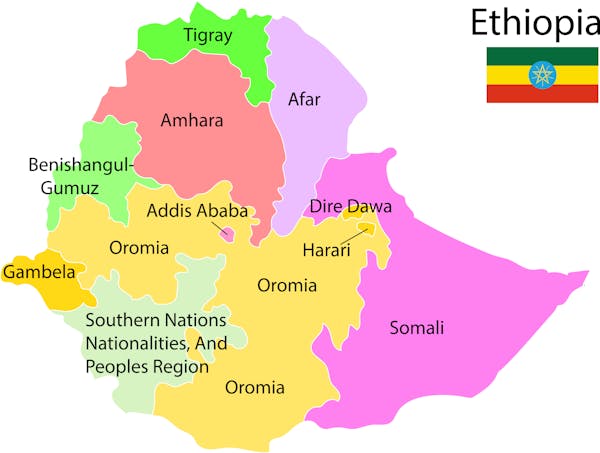
The Sidama have had their own state in the past, but have been part of the Southern State since 1995. Credit: Carsten ten Brink.
Mounting tensions in southern Ethiopia are creating high levels of nervousness in the country. At the centre of the conflict is the clamour for internal secession by the Sidama, the country’s fifth largest ethic group.
Sidama activists requested a referendum on having their own state last year, but the government failed to organise one despite being required to by the constitution. Amid growing tensions, Sidama campaigners vowed to declare their own federal state on 18 July, the deadline for the vote. Security forces clashed with local protesters, reportedly killing dozens and injuring more.
In response, the federal government promised to hold a referendum within five months, which the Sidama opposition party accepted. On 23 July, the federal government then declared that it, rather than the local authorities, is now in charge of maintaining peace and security in the region.
Why the Sidama want their own state
Ethiopia has 80 ethnic groups. More than two decades ago, the country adopted a constitution that uses ethnicity as a basis to organise the federation. But only five of the nine states are home to a dominant ethnic community. The remaining four states are markedly multi-ethnic.
Here the complications set in. While some numerically stronger ethnic communities have been denied the status of a state, some smaller ones have a state to call their own. For example, the state of Harari is home to the eponymous community of fewer than 200,000 people. On the other hand there are ethnic groups, like the Sidama – with more than three million people – that don’t have a state of their own.
It has not always been like this. The Sidama have a history of distinct administrative existence dating back to imperial days. Moreover, in 1991, an ethnically-defined state of Sidama was established, but it was abolished when Ethiopia adopted a new constitution in 1995. In that process, the Southern Nations and Nationalities and People’s Regional State (SNNPR) was created and the Sidama became just one of the 56 or so its resident ethnic groups.

Since then, members of the Sidama community have been demanding their own state, pointing to the likes of Harari.
Ethiopia now faces a hugely complex legal and political issue. In the Sidama’s favour is the fact that Article 47(2) of the constitution gives ethnic groups the right to establish a state of their own. It would seem that all a community needs to do is to show the initiative has support through a simple majority vote. But the reality is more complicated.
As Prime Minister Abiy Ahmed made clear recently, the clauses in the constitution dealing with secession are open to wide interpretation. A majority vote in favour of statehood might not be sufficient, he said, because the constitution only lists nine states. Getting the prospective state of Sidama onto that list so that it would be part of Ethiopia would require a constitutional amendment.
Many, including myself, were quick to dismiss this as an act of legal gymnastics. After all, the constitution says a new state becomes a member of the federation without needing to apply, But Abiy was correct that the constitution would have to be amended to include Sidama for its quest for statehood to be fully complete.
This is important because this change would require the support of the two houses of the federal parliament and the legislative assemblies of at least two-thirds of the states. One might argue that a successful referendum result in Sidama ought to be sufficient to urge lawmakers to issue this approval. But what about SNNPR from which Sidama would be seceding? There is no language of obligation in Article 47. It gives ethnic communities the right to demand internal secession, but does not impose a corresponding duty on the others to accept it.
To the negotiating table
Even if an obligation to accept the Sidama communities wishes did exist, there would still be the need to negotiate. The federal government, the SNNPR government, and the Sidama local governments must all come discuss the possibilities and ramifications of a new state.
As things stand, all roads lead to the negotiating table. The Sidama people’s struggle for their own state has reached the point of no return, with state and federal authorities having agreed to hold a referendum within five months. But in the meantime, it is crucial that authorities engage to work out many of the questions that remain unanswered. Among other things, they must decide who is eligible to vote, how assets would be divided up, and they must address the concerns of individuals that do not belong to the Sidama ethnic group.
Ethiopia is in an extremely fragile political situation. It can’t afford the instability and chaos that might follow from the disorderly partitioning of an existing state and a similar push by others. For the good of Sidama, SNNPR and Ethiopia as a whole, all parties affected must work towards a cooperative internal secession.
A longer version of this article was first published on the IACL-IADC Blog under the title “Internal secession and Federalism in Ethiopia”.The ConversationThis article is republished from The Conversation under a Creative Commons license.
Read the original article.
https://africanarguments.org/2019/07/31 ... otiations/